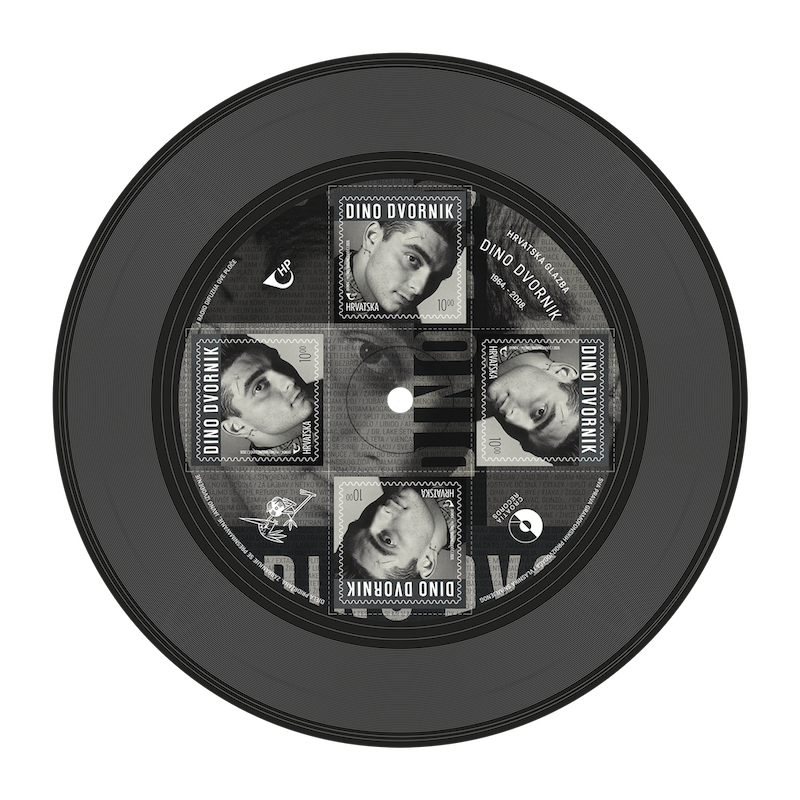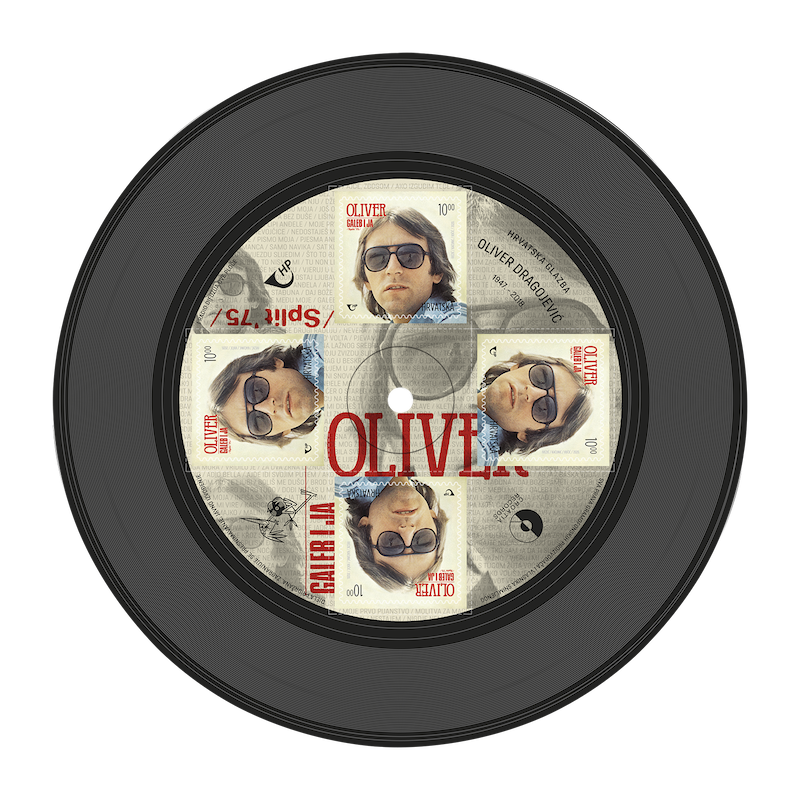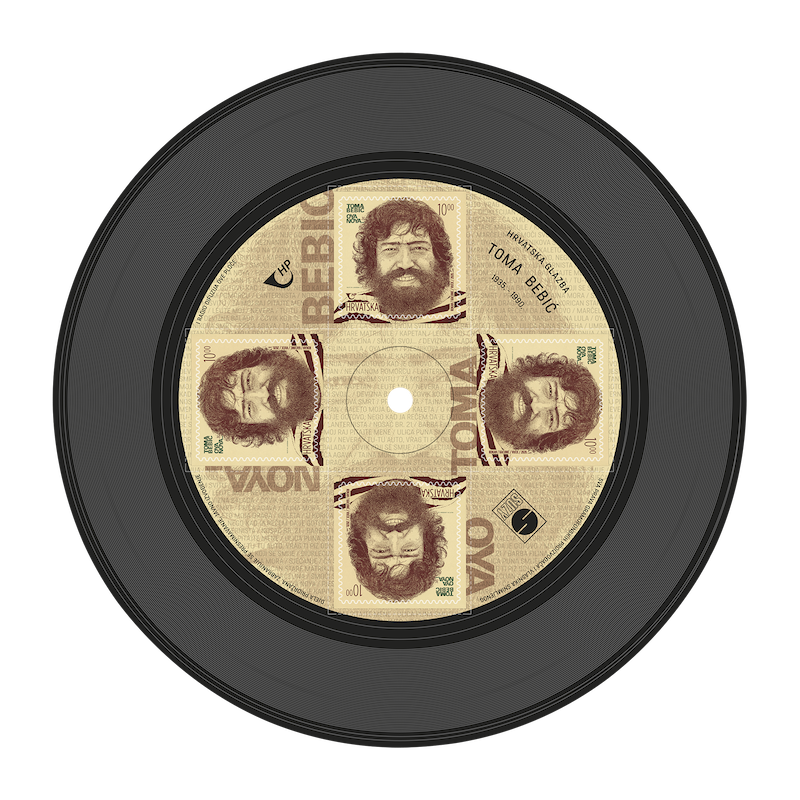Croatian Post Releases New Commemorative Stamps with Legends of Croatian Music
September 26, 2020 - Croatian Post releases new commemorative stamps from the "Croatian Music" series on September 28, 2020.
As the Croatian Post website states, the motifs on the stamps show reproductions of the most famous editions of gramophone records by Dino Dvornik, Oliver Dragojević and Tomo Bebić. The authors of the commemorative postage stamps are Ivana Vučić and Tomislav-Jurica Kaćunić, designers from Zagreb. The nominal value of the stamp is the same for each motif and amounts to HRK 10.00. The stamps were printed in a circulation of 100,000 copies per motif, of which 1,000 sheets were in the corresponding numbered cases. The commemorative stamps were printed in sheets with four self-adhesive stamps, and the Croatian Post also issued a commemorative First Day Cover (FDC). Round arches imitate a gramophone record.
Dino Dvornik's musical legacy (August 20, 1964 - September 7, 2008), as well as his private and entertainment life, which are permanently intertwined, testify to the enormous talent and eruptive music in which, regardless of the scale of inspiration, is always furious rhythm and passion. It was obvious when he released his debut album in 1989, which gave the megahit "Zašto praviš slona od mene", one of the biggest - but also the best - hits from the late eighties. With it, Dino announced that funk is neither a teenage infection nor a fashionable trend, but a pure and unadulterated passion. This was also shown by the following projects, such as the album Kreativni nered, released a year later, with exceptional compositions such as "Udri jače manijače", which is at the very top of the Croatian songbook of the 1990s.

Croatian Post
If the war years deprived him of huge circulations and sold-out tours, they certainly did not affect his creativity. On the album Priroda i društvo, released in 1993, he stepped towards more serious topics, but also showed that he is equally capable of composing flawless R'n'B-pop stylizations and successfully and pioneeringly experimenting with techno/house rhythms, which are almost ubiquitous on the album. At a time when the domestic scene was leaning towards dance, in 1995 he released Africa, one of the best, but also the most influential numbers of Croatian music in the 1990s, and two years later the exceptional album Enfant Terrible. He remained on the trail of funk until the end and the album Pandora's Box, which was released posthumously immediately after the premature departure of the Croatian uncrowned "king of funk".
Oliver Dragojević (December 7, 1947 - July 29, 2018) is a singer who, just like Frank Sinatra, deserved to be called "The Voice". Also known as the "cosmic Dalmatian", the father, son, and holy spirit of Dalmatian song and "southern consolation", which he long ago patented with his emotional vocal "rasp", Oliver was certainly the best singer among musicians and the best musician among singers. A multi-instrumentalist and a great keyboardist in his long career, he has gone from rock and pop to pop music and jazzy styles. Giving his voice and soul to the numerous eternal melodies of the Split Festival written by Zdenko Runjić, in the 1990s he opened a new lucrative period and career with "Cesarica" by collaborating with many young composers.

Croatian Post
While in the seventies and eighties he was a cult "Dalmatian singer" with anthems and anthological compositions such as "Galeb", "Malinkonija", "Oprosti mi pape", "Skalinade", "Karoce", "Ništa nova", "Stine" and others, and with a range far greater than the regional borders, in the 1990s and the new millennium, he became the biggest and brightest star (not only) of the Croatian scene. Moreover, great ballads typical in the 2000s were given a unique emotional timbre by collaborating successfully with composers and musicians from other genre niches whom - just like Ray Charles, Wonder or Cocciante - he experienced as brothers in the same passion, inspiration and musical inclinations. The result is songs that, presented at the world's most important concert addresses, make the grand finale of a brilliant career of a singer (and musician) who left eternal melodies "until the end of time" with the unbearable ease of talent and musicality. As an epitaph and as a will.
Toma Bebić (1939 - February 1990), aphorist, messy poet, goatherd, a stubborn advocate of every alternative, even the author of picture books and books of twisted aphorisms, became a legend during his lifetime. Admittedly, after his untimely death, he was left with a small discographic opus, but the influence of his key compositions was much, much greater. No wonder because Toma and his most famous songs like "Kaleta", "Nevera", "Oya Noya", Ča smo na ovom svitu", "Leute moj", "Marčeline" and others became almost anthems of both traditionalists and supporters of the festival alternative from Split's Prokurative. Unfortunately, partly due to his own negligence, and partly paying a tribute to "provinciality", Toma's discography is generally weaker than the value of the songs themselves and exceptional concert performances.

Croatian Post
His compositions were mostly "Dalmatian chansons" with special dedications to the homeland, but before and after all they spoke about everyday situations and "little people", marginals with whom - as a bohemian and an anarchist - he got along best. Singing in a hoarse and suggestive voice, they flashed on Oya Noya's 1980 album, with the singer-songwriter hits "Nevera", "Leute moj", "Marčelina", "Tu-tu auto, vrag ti piz… odnija", "Za moj raj pitajte mene "... confirming Bebić's role as a pop star in the absolute deviation from the clothing of the then Split-festival hit songs. Permanently interesting as a "messy" phenomenon of "Split studies" and a distinctive chansonnier, Toma was and remains a cult figure not only of the Split but also of the Croatian music scene.
For the latest travel info, bookmark our main travel info article, which is updated daily.
Read the Croatian Travel Update in your language - now available in 24 languages
Join the Total Croatia Travel INFO Viber community.
Split Without Dino Dvornik Tribute Festival 'Aj Cha' this Year, Back On in 2020?
August 21, 2019 - The 'Aj Cha' festival dedicated to Dino Dvornik will not be held in Split this year, which was confirmed by the organizers on Tuesday.
“This year we will not organize the festival, but we are already preparing for the next one. We have paused for a number of reasons this year, but plan to honor Dino in continuing the organization of the festival," the organizers answered briefly for Dalmatinski Portal.
Recall, the first festival dedicated to Dino Dvornik and funk music was held in 2017 at several locations - at the old Hajduk grounds, on the Riva stage in front of the Splitska banka, on Bačvice beach and at the Bačvice Summer Cinema. The program was led by the Songkillers who opened the festival. The day after, Jinxi performed, and on the final day, a concert of ‘Split kids’ was held, featuring Neno Belan and Fiumensi, Marijan Ban and Diktatori, the Official Dino Dvornik Tribute Band with Nikola Marjanović, and as a special surprise guest - Gibonni.
The festival is held in Split, Dino's beloved hometown and where his stardom began, which had a great impact on his career and music. The second edition was opened by Noa & Funkblasters, featured Psihomodo pop who played at Bedem Cornaro, and closed with Dubioza kolektiv.
Dino Dvornik was a Croatian musician, singer, composer, songwriter, and actor born in Split on August 20, 1964.
Dino was born as the second child of famous actor Boris Dvornik and mother Diana Tomić. From an early age, he was destined for the spotlight, and along with older brother Dean, he appeared in Miljenko Smoje’s cult series “Naše Malo Misto”.
Dino soon found out that it was not acting he was after, and decided to pursue music instead.
In 1981 when he was 17, he created a funk composition named "Kineski Zid" with brother Dean. The name of the group paid homage to the name of the building they lived in. Namely, “Kineski Zid” referred to one of two twin buildings in Split in the quarter of Spinut which was built in 1971. Located near Poljud Stadium, the buildings are the longest buildings with the largest number of squares and flats in Split.
Kineski Zid was inspired by the musical genre of funk and was influenced especially by the sounds of James Brown, Stevie Wonder, Kool and the Gang, George Benson, Earth Wind and Fire. Thus, Dino and Dean are known to have recorded the first funk material in former Yugoslavia. After the release of the album and a difference in ideas between Dino and Dean, Dino turned to a solo career that would one day consider him the Croatian King of Funk.
Dino’s music marked the late 80s and early 90s, and more often than not, Dino’s songs are still played in clubs around Croatia today. We’re sure you’ll recognize some of these.
Dino was a four-time winner of the biggest music award in Croatia, the Porin, and was nominated a total of eight times. Two Porins were awarded to Dino in 1996 for the song “Afrika”, in 1998 he won the Porin for the album “Enfant terrible” for the best production, and in 1999 he won for the best album, “Vidi of pisme”.
Dino was survived by his wife, Danijela, and his daughter Ella who have both helped to give Dino life after death through their projects.
This year marks the eleventh anniversary of the Croatian King of Funk's untimely death, though no festival will be held in his memory.
To read more about lifestyle in Croatia, follow TCN’s dedicated page.
'Aj Cha' Festival Returns this Week in Honor of Croatian King of Funk
Dino Dvornik's music has raised many generations and marked the lives of all of us. So why not celebrate him?
Ništa Kontra Splita: Remembering Dino Dvornik, King of Funk
“Nothing Against Split”: The famous words of Dino Dvornik, Split legend and Croatian King of Funk.
AJ CHA Festival: From Bačvice to Stari Plac, Split Prepares for 3 Days of Madness
“If you built a tent above it, it would be the biggest circus in the world."
VIDEO: African Orphanage Sings Dino Dvornik
Children from an orphanage in Africa learn the songs of Dino Dvornik.
Famous Croatian Lifestyle Blogger Ella Dvornik Returns to Split, See the Photos!
A great promotion for the city of Split.


